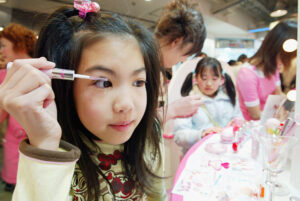“I see pregnant people.” Somewhere inside my brain, the little boy from Sixth Sense is balefully trying to explain why on earth it is that everywhere I look are expectant mothers. I get on the Tube — a little girl with big, twinkly eyes is showing me her lollipop. Her heavily pregnant mum smiles sweetly as she balances her on her knee; her dad, I notice, sits three seats away staring angrily into space. Tut tut, I think. They reach their stop and the man snaps out of it, reaching out his hand and walking the toddler to the next platform. Aw, I think. I get to London Bridge, and a woman on her break is furtively vaping, half-hidden by a wall. I gasp — she must be seven months along! She glowers at me for rubbernecking through a blue razz lemonade-flavoured mist.
Fair enough, I think. After all, who am I — a mere teenage girl — to judge the actions of real adults and their offspring? With a jolt, I remember that I am in fact 25; that, by my age, my mum had already had two kids. In London, women are split into the camps of children-having and fun-crisis-situationship-having. My friends and I live almost exactly as we did when we were 19: apart from my obsession with chokers, little has changed about the way I dress, speak, drink and date now. Whenever anyone gets engaged, someone barks “child bride” and we all laugh. But intrusions into our collective fantasy about motherhood being a million miles away have started to rattle me: only recently, at a semi-ironic summer solstice party (I hate myself as much as you do), someone next to me in the “circle” declared that her “intention” for the year was to freeze her eggs. What! But you, like me, are a mere slip of a girl! Reader, she was 31.
Then, and most shockingly of all, a friend from uni tells me she really just wants to quit her job and have a baby. Notably, she is in the position to: she married our other neighbour in our first-year corridor. I, conversely, went out with a boy from the next block over, a relationship with decidedly less longevity. I splutter, I spit feathers: whaaaat! But women fought for us to… and we must stand on an equal foot… and we must engage with the public sphere… It all fell on deaf ears. She was resolute. Work is hard and boring, she says. “I just want to stay at home.”
Despite my heightened antennae for all things maternal — probably something to do with that dastardly biological clock — the idea of wanting to peace out of the rat race and start a family sends a shiver down my spine. It goes against everything I was taught: at my notoriously gung-ho girls’ school, our headmistress memorably delivered an entire assembly on not having kids too young (and when we do, to give birth standing up). I realise now that much of my twenties has been shaped by slick career-girl editorials in glossy magazines, or countless sitcoms in which protagonists endure messy romances season after season, living as petrified teenage girls. Our culture is shot through with aspirational Peter Pan fantasies about chaotic young adulthood: can you name a song about falling in love? Now, name one about being a mother. We infantilise ourselves constantly: we’re “just girls” who do “girl math” while eating “girl dinner” before a “hot girl walk”.
But the issue of motherhood hangs like a sword of Damocles over our heads. In “uncool” circles, the fate of our bodies is becoming a hot topic: falling birth rates and emergent pro-natalism movements are becoming less and less fringe. For this, we have last May’s NatCon conference, which launched a thousand smirks, to thank. A memorable edition of The News Agents saw Lewis Goodall sniffing around and being shocked by unfashionable appeals to the traditional family, faith and gender relations; I acknowledge my own snobbery about such views. But am I being purposefully blind? My generation has a constant eye on the climate crisis, the housing crisis, the pitfalls of dating culture; but the issue of Europe’s birth rates — undoubtedly a consequence of all three of those things, to a greater or lesser degree — isn’t about us, we tell ourselves.
In fact, it is. Office for National Statistics data released in February showed that the total fertility rate in England and Wales had decreased to 1.49 children per woman in 2022 from 1.55 in 2021; it has been falling since 2010. It is so tempting to see these broader demographic issues as external to our own lives, but as Dr Mary-Ann Stephenson of the Women’s Budget Group told The Guardian: “We need the babies who are born now, because they will be the people whose taxes pay for our healthcare. These will be the people looking after us in our old age. These will be the doctors and nurses and care workers of the future.”
I am as likely to have a baby now as I am to adopt an XL bully. It’s so easy to see ourselves as at one remove from demographic concerns — and the contingent myths of modern femininity all prop up this view: a friend insists she will never have biological children, as she “doesn’t want to put her body through that”. The figment of women’s bodies as temples, as the vessel of wellness, may partly explain the sidelining of pregnancy and childbirth as gruesome or in some way defiling. This doesn’t strike me as particularly progressive.
Even if we wanted children, do men? I know of no man my age who wants or is financially stable enough to have children now. If culture has taught women to baulk at being saddled with a child, it has taught men to baulk at everything that child will represent economically — and the emotional ties it creates with a woman. The narrative of modern romance tells us that, when we eventually do settle down, we’ll have to haggle and harass a man to get married before niggling and nagging them to give us a baby.
Perhaps this explains the shockwaves created by Netflix’s latest true crime offering, The Man with 1,000 Kids. The documentary follows Jonathan Meijer, a Dutch man who has fathered — via both sperm banks and “natural donation” — possibly more than 3,000 children so far. He told each family that he would only be helping a maximum of four others, but instead engendered a host of moral and medical problems, not least consanguinity, to satisfy a thirst for power, a god complex. There is something so startlingly jarring about Meijer’s use of a system as modern and bureaucratised as sperm donation to do something so very animal: to maximise, at any cost, the dispersal of your genetic material, a one-man dandelion.
This approach is not without precedent. In the chasm opening up between liberal values and plummeting birth rates, radical approaches to natalism are taking hold. The Quiverfull movement, a primarily American Christian subset, exploded in the wake of Mary Pride’s 1985 book The Way Home: Beyond Feminism, Back to Reality. Pride pitted traditional ideals of large families and biblical lifestyles against feminism’s embrace of birth control; children are seen as arrows in a quiver, extracted from Psalm 127:3-5. The movement is small but mighty, belonging to a constellation of sects which sprang up in the late 20th century and platformed fecundity as a central moral virtue.
In a sign of things to come, pro-natalism is now anything but an exclusively religious quirk: in tech circles, it is the thought experiment du jour. Sam Altman, founder of OpenAI, has ploughed investments into reproductive tech, while in 2022, father-of-11 Elon Musk declared that “population collapse due to low birthrates is a much bigger risk to civilisation than global warming”. And in May, a Guardian article about “techno-puritanists” Malcolm and Simone Collins delighted readers with a snapshot of their frankly whacko brood: Torsten Savage, Octavian George and Industry Americus are mentioned among a prospective gaggle of up to 13 kids — homeschooled (of course) and under suspiciously close observation from child protective services.
Such groups may yet be fringe, and seem oppressive and laughable to the mainstream. Yet radical pro-natalism is only going to grow as motherhood, an ancient political battleground, is electrified by the ever more frightening socioeconomic outlook. Perhaps the only way to make this inevitable tide of pressure and debate work for us is first to recognise it as a collective issue, then to push for a system which does not actively punish women for having children: affordable childcare so that we do not face a career cliff edge; affordable housing so that settling down seems even remotely possible.
I cannot envision having children any time soon — for all the delusions I have mentioned (I am too cool, too clever, too ambitious) and the realities (too single) — but maybe I am part of the problem. In 10 years’ time, it may be that a toddler in Hackney is whispered about with the same incredulity as a unicorn sighting. In 70 years’ time, it may be that my wrinkly friends and I face old age in a robot-run retirement complex, with no sprightly young carers to speak of. Beep beep, boop boop, time for your sponge bath Ms Sowerby! If that doesn’t give you pause for thought, I don’t know what will.
Disclaimer
Some of the posts we share are controversial and we do not necessarily agree with them in the whole extend. Sometimes we agree with the content or part of it but we do not agree with the narration or language. Nevertheless we find them somehow interesting, valuable and/or informative or we share them, because we strongly believe in freedom of speech, free press and journalism. We strongly encourage you to have a critical approach to all the content, do your own research and analysis to build your own opinion.
We would be glad to have your feedback.
Source: UnHerd Read the original article here: https://unherd.com/



